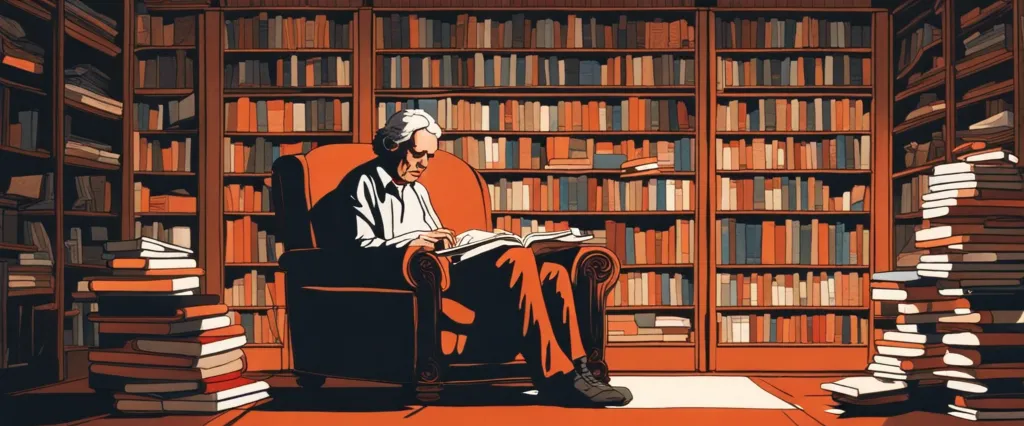
In the realm of literature, there exist select masterpieces that delve into the intricate and captivating exploration of one of the most enigmatic emotions known to humanity: love. Alain Badiou’s groundbreaking work, “In Praise of Love,” and Erich Fromm’s timeless classic, “The Art of Loving,” stand as two shining beacons in this realm, offering distinct perspectives on the complexities of this universal phenomenon.
Published over half a century apart, these works take on love from unique vantage points, yet both authors seek to unravel the mysteries surrounding it, guiding readers towards a deeper understanding and appreciation of this complex emotion. While Badiou delves into the philosophical depths of love, Fromm approaches it from a psychological perspective. Together, these texts offer an enriching comparative study that delves into the very essence of love and its significance in our lives.
Badiou’s “In Praise of Love” presents a profound exploration of love’s essence, its place in a modern society, and its intersection with politics and art. Through his philosophical lens, Badiou delves into the fundamental nature of love, analyzing its transformative power and the ways in which it can challenge social and cultural constructs. He critically examines the pervasive culture of commodification and romanticism, urging readers to reconsider the true meaning and value of love amidst a capitalist society that often reduces it to mere consumerism.
On the other hand, Fromm’s “The Art of Loving” delves into the psychological aspects of love, offering an insightful analysis of its many forms and expressions. With a focus on self-love, familial love, erotic love, and love for humanity, Fromm explores the intricate connections between love and our individual growth and fulfillment. Drawing upon Freudian psychoanalysis and his own experiences as a psychoanalyst, Fromm unveils the pivotal role that love plays in shaping our identity, personal happiness, and the overall well-being of society.
As we embark on this comparative study, we aim to juxtapose these two profound works, examining their similarities and differences in terms of theoretical frameworks, perspectives on love, and their impact on readers’ understanding of this age-old emotion. By exploring the philosophical and psychological underpinnings of love through the lens of Badiou and Fromm, we seek to uncover the multifaceted nature of love and rediscover its relevance in our increasingly complex and fragmented world.
Through this comparative analysis, we hope to shed light on the essence of love, its intricate entanglements with our social and individual lives, and the ways in which these seminal works continue to shape our understanding of this eternal, elusive, and profound emotion. Ultimately, this study aims to illuminate the enduring significance of love in shaping our identities, relationships, and the very fabric of society itself.
Brief Summary of Two Books
In Praise of Love by Alain Badiou
In “In Praise of Love,” Alain Badiou explores the nature of love in contemporary society and reflects on its philosophical and political implications. Badiou argues that the dominant notion of love has been reduced to a romantic and individualistic concept primarily concerned with personal fulfillment.
He criticizes this depoliticized understanding of love, asserting that it masks the true power of love as a catalyst for transformative action and genuine equality. Badiou posits that we should embrace a more profound concept of love that challenges the prevailing conservative and capitalist ideologies.
Through a series of dialogues, Badiou engages with various interlocutors to explore the political potential of love, extrapolating from historical events and thinkers like Plato and Mao Zedong. He argues that love is inherently tied to the construction of communities and revolutions, and should be seen as a force that can drive social change and generate radical transformations.
Ultimately, Badiou calls for a love that goes beyond romantic fantasies and self-interest, urging individuals to reclaim love as a political project that can challenge and subvert oppressive systems. He invites readers to reflect on the implications of this political vision of love and to reconsider their own understanding of love in the contemporary world.
The Art of Loving by Erich Fromm
The Art of Loving” by Erich Fromm explores the idea that love is not simply a feeling or emotion, but a skill that can be learned and developed. Fromm argues that the modern understanding of love is often distorted, being focused on the need for love rather than the ability to give it.
Through different chapters, Fromm discusses various aspects of love, including self-love, brotherly love, erotic love, and maternal love. He analyzes the societal and cultural factors that hinder the cultivation of genuine love, such as the norms of consumerist society and the fear of freedom.
Fromm proposes that love requires effort, discipline, and concentration, as well as the development of certain qualities such as maturity, faith, and humility. The book emphasizes that true love is an active practice, involving giving, understanding, and respecting oneself and others.
Furthermore, Fromm reflects on the connection between love and the individuation process, asserting that one’s ability to love is intricately linked to their ability to become a fully realized individual. He explores the concept of love as an art, comparing it to other artistic endeavors that require continuous effort and engagement.
Overall, “The Art of Loving” offers a philosophical perspective on the nature of love, challenging conventional beliefs and urging readers to embrace love as a transformative force in their lives.
Comparison between Two Books

Similarities in intimacy
In both “In Praise of Love” by Alain Badiou and “The Art of Loving” by Erich Fromm, the authors explore the concept of intimacy and emphasize its significance in human relationships. Despite being written from different perspectives, both books share several similarities in their understanding and portrayal of intimacy.
1. Intimacy as an Active Process: Both Badiou and Fromm argue that intimacy is not a passive state or a mere feeling that happens by chance, but an active process that requires conscious effort and commitment. They emphasize that individuals must actively engage in nurturing and cultivating intimacy with their partners, family, or communities.
2. Authenticity and Self-Discovery: For both authors, intimacy is closely connected to self-discovery and the authentic expression of one’s true self. Badiou argues that true love requires individuals to remain loyal to their own worldview and principles, while Fromm emphasizes the importance of self-awareness and taking responsibility for one’s own personal growth to establish genuine connections with others.
3. A Universal and Political Aspect: Both works view intimacy not only as a personal matter but also as something that has universal and political implications. Badiou argues that love should transcend personal bonds and encompass broader social and ethical concerns. Similarly, Fromm suggests that genuine love requires individuals to engage with society and work towards creating a more compassionate and just world.
4. An Emphasis on Communication and Dialogue: Both Badiou and Fromm stress the significance of open and honest communication in developing intimacy. They underline the importance of active listening, understanding, and dialogue as means to forge deeper connections with others.
5. A Holistic Understanding of Intimacy: These books move beyond a narrow conceptualization of intimacy being exclusively romantic or sexual in nature. Instead, intimacy is portrayed as a multifaceted experience that encompasses emotional, intellectual, and social aspects. The authors argue that intimacy can be fostered in various relationships, such as friendships, family bonds, and even in one’s connection with a particular cause or community.
Overall, despite the different approaches and philosophical backgrounds of Badiou and Fromm, the similarities in their understanding of intimacy in these books highlight the significance of actively working towards genuine connections, being authentic, engaging with others and society, emphasizing communication, and embracing a holistic view of intimacy as essential for human relationships.
Divergences in intimacy
In comparing “In Praise of Love” by Alain Badiou and “The Art of Loving” by Erich Fromm, it becomes apparent that both authors explore the concept of love and its various manifestations. However, there are notable divergences regarding the understanding and interpretation of intimacy in these books.
1. Definition of Intimacy:
– Fromm: In “The Art of Loving,” Fromm defines intimacy as an essential component of love, emphasizing its capacity to establish deep connections with others. He views intimacy as the result of active engagement, mutual understanding, and the willingness to dedicate time and effort in cultivating relationships.
– Badiou: On the other hand, Badiou’s “In Praise of Love” has a more abstract understanding of intimacy. While he acknowledges its existence, he views it as an elusive and fragile element. Badiou believes that under the dominant culture of global capitalism, the true experience of intimacy is increasingly difficult to achieve, often overshadowed by a focus on narcissism and superficial desires.
2. Relationship Dynamics:
– Fromm: Fromm emphasizes the importance of reciprocity and mutual growth in intimate relationships. He suggests that true intimacy can only be achieved when individuals maintain open communication, respect each other’s differences, and strive for equal participation in the relationship. For him, intimacy is a continuous process that evolves through constant effort and genuine emotional connection.
– Badiou: In contrast, Badiou critiques contemporary society’s overemphasis on romantic relationships and argues that true intimacy should extend beyond the couple. He advocates for a more collective form of love that embraces political and community involvement. Badiou sees intimacy as a tool for collective action and change, rather than individual fulfillment within the bounds of a relationship.
3. Love’s Paradox:
– Fromm: Fromm believes that genuine intimacy requires one to overcome feelings of isolation and fear of self-disclosure. He argues that love involves a paradox: to reach true intimacy, individuals must simultaneously feel a sense of connectedness with others while maintaining their individuality. For Fromm, the ability to balance autonomy and connection is the key to successful intimate relationships.
– Badiou: In Badiou’s perspective, love’s paradox lies in its ability to unite people in a common cause or idea, despite recognizing the inherent differences and conflicts present in any relationship. He contends that true intimacy requires individuals to be committed to an idea or belief that transcends personal desires and interests, leading to a collective pursuit of a higher truth or purpose.
In summary, “In Praise of Love” and “The Art of Loving” approach the concept of intimacy from different angles. Fromm focuses on the personal and psychological aspects, highlighting the importance of individual growth and mutual connection in intimate relationships. Conversely, Badiou extends the discussion to sociopolitical dimensions, emphasizing the need for collective action and commitment to a greater cause. While both authors explore intimacy within the realm of love, their divergences reflect different philosophical perspectives and the contexts they address.

Conclusion
Both “In Praise of Love” by Alain Badiou and “The Art of Loving” by Erich Fromm are highly regarded books on the topic of love, but they approach the subject from different perspectives.
“In Praise of Love” by Alain Badiou is a philosophical exploration of love in the context of modern society. Badiou examines the decline of love in our consumer-driven culture and argues for the importance of love as a transformative force. He reflects upon the nature of love, its potential for political and social change, and the ways in which it can challenge established norms. If you are interested in a philosophical analysis of love and its role in society, this book may be more suitable for you.
On the other hand, “The Art of Loving” by Erich Fromm is a psychological exploration of love and relationships. Fromm delves into the various aspects of love, including self-love, parental love, brotherly love, and romantic love. He explores the conditions necessary for a healthy and fulfilling love, analyzes the cultural influences on our understanding of love, and provides practical advice on building and maintaining loving relationships. If you are interested in a psychological exploration of love and practical guidance on building loving relationships, this book would be more suitable for you.
Ultimately, the choice between the two books depends on your personal interests and what you are seeking to gain from your reading.



